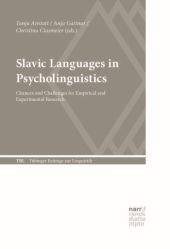 Neuerscheinungen 2016Stand: 2020-02-01 |
Schnellsuche
ISBN/Stichwort/Autor
|
Herderstraße 10
10625 Berlin
Tel.: 030 315 714 16
Fax 030 315 714 14
info@buchspektrum.de |

Tanja Anstatt, Christina Clasmeier, Anja Gattnar
(Beteiligte)
Slavic Languages in Psycholinguistics
Chances and Challenges for Empirical and Experimental Research
Herausgegeben von Anstatt, Tanja; Clasmeier, Christina; Gattnar, Anja
1. Auflage. 2016. 315 S. 220 mm
Verlag/Jahr: NARR 2016
ISBN: 3-8233-6969-5 (3823369695)
Neue ISBN: 978-3-8233-6969-1 (9783823369691)
Preis und Lieferzeit: Bitte klicken
Psycholinguistik untersucht die Verankerung von Sprache in der Kognition. Die strukturellen Eigenschaften der slavischen Sprachen bieten ergiebige Ansatzpunkte für die Weiterentwicklung der Psycholinguistik, gleichzeitig steht ihre Erforschung mit experimentellen Methoden noch am Anfang. Dieses Buch gibt einen Einblick in die aktuelle Forschung zu diesem Bereich. Dabei werden insbesondere methodische Fragen fokussiert und ihre Anwendung auf slavische Sprachen diskutiert. Weiterhin wird der Beitrag beleuchtet, den speziell die slavischen Sprachen zu psycholinguistischen Erkenntnissen leisten können.
Psycholinguistics explores the anchoring of language in cognition. The Slavic languages are an attractive topic for psycholinguistic studies since their structural characteristics offer great starting points for the development of research on speech processing. The research of these languages with experimental methods is, however, still in its infancy. This book provides an insight into the current research within this field. On one hand, central topic is the question of how Slavic languages can contribute to psycholinguistic findings. On the other hand, all chapters introduce their respective psycholinguistic method and discuss it according to its usefulness and transferability to the Slavic languages. The researched languages are mainly Russian and Czech, however, other languages (e.g., Polish, Belarusian or Bulgarian) are touched upon as well. Main topics are the characteristics of the mental lexicon, multilingualism, word recognition, and sentence comprehension. Furthermore, several contributions address the issue of verbal aspect and aktionsarten as well as other grammatical categories.
Introduction
Barbara Mertins: The use of experimental methods in linguistic research:
advantages, problems and possible pitfalls
Roumyana Slabakova: How to investigate interpretation in Slavic experimentally?
Dagmar Divjak, Antti Arppe & Harald Baayen: Does language-as-used fit a self-paced reading paradigm? (The answer may well depend on how you model the data.)
Anja Gattnar: One experiment different languages: A challenge for the transfer of experimental designs. Examples from cross-linguistic and inner-Slavic research 83
Anastasia Makarova: Variation in Russian verbal prefixes and psycholinguistic experiments
Denisa Bordag: Reaction time methodology in psycholinguistic research: An overview of studies on Czech morphology
Elena Dieser: Some cases of doubt in Russian grammar from different methodical perspectives
Julija Nigmatulina, Olga Raeva, Elena Riechakajnen, Natalija Slepokurova & Anatolij Vencov: How to study spoken word recognition: evidence from Russian
Christina Clasmeier, Tanja Anstatt, Jessica Ernst & Eva Belke: Are Schalter and apka good competitors? Searching for stimuli for an investigation of the Russian-German bilingual mental lexicon
Bernhard Brehmer, Tatjana Kurbangulova & Martin Winski: Measuring lexical proficiency in Slavic heritage languages: A comparison of different experimental approaches
Jan Patrick Zeller, Gerd Hentschel & Esther Ruigendijk: Psycholinguistic aspects of Belarusian-Russian language contact. An ERP study on code-switching between closely related languages
Jakub Jehlicka: Influence of spatial language on the non-linguistic spatial reasoning of sign language users. A comparison between Czech Sign Language users and Czech non-signers
Index
Notes on Contributors


